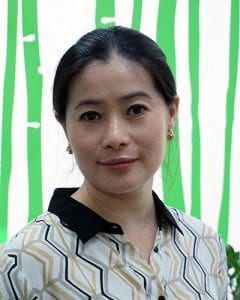 As a teenager, Lynn Wang (B.A. CS ’02) immigrated to Austin, Texas in 1997 with her mother, who had been accepted into graduate school for biomedical engineering.
As a teenager, Lynn Wang (B.A. CS ’02) immigrated to Austin, Texas in 1997 with her mother, who had been accepted into graduate school for biomedical engineering.
Wang said, “My mother was in her 40’s and in grad school when she became aware it might be difficult to find job in her field. The dot com era was just beginning and she realized the Austin software industry promised more job security.”
While Wang was worked her way through grade school, her mother worked on her Ph.D., and also completed all the course work associated with a bachelor’s in computer science.
“She defended her thesis in lasers, but used her coursework to get a job at IBM. With that opportunity, we were able to move up from being poor immigrants to being middle class Americans. So in high school when I said I wanted to be a doctor, she told me, ‘Get a computer science degree; you’ll always be able to put bread on the table.’ And she didn’t think I could get into med school,” said Wang.
Following her mother’s advice, Wang entered Rice University as a CS major, the go-to field of study for the women in her family.
“It might have been male-dominated, but all the girls in my family did it. And I was getting good at it. But I looked around at my classmates and realized they had more passion for it, even the ones with lower grades. I did it, but I didn’t love it,” said Wang.
“So I got a CS degree and went straight to med school. Even though a number of Rice CS alumni have become doctors, pre-med was like our dirty secret. I was ‘outed’ in my senior year, when I was being recruited for the PhD program. The professor said I was crazy to choose med school instead. Another CS student was also ‘outed’ after the MCAT. He told me, ‘I didn’t know you were also a secret pre-med.’ He went on to med school at Harvard and I headed to Columbia.”
Wang said her CS training has been beneficial to her career as a doctor, but her first two years in medical school were rough because she had focused on solving complex problems rather than practicing large volume knowledge acquisition.
“On one hand, my CS degree helped me get into med school; there were very few engineering degrees among the applicants and I stood out from the other candidates. But I entered med school lacking practice in information acquisition that the other students had picked up as undergraduates. They had memorized lots and lots of stuff. I had memorized nothing. Therefore, I sucked at the first two years of med school.
“I’d always been a rather good student, so to get into the field of my choice and earn bad grades – it was crushing. Then I hit the clinical part, and I was relieved to realize that everything I’d learned in CS about solving problems was quite applicable to dealing with patients.”
She drew a parallel between solving software and patient problems. Wang said both start with broad and abstract problems. Software is usually designed in broad strokes and finalized with minutiae. Wang feels a good engineer can see all the levels of detail at the same time and is adept at going back and forth between the perspectives.
“As a doctor, that is what I do,” she said. “I take a patient’s broad problem, then dive down to the nth degree. ‘Can your pharmacy fill this prescription, and can you afford the co-pay? What are the other complications? How will it affect your job? Will it prevent you from working to earn food and fuel? Can you afford the next co-pay to see me?’ It requires focusing on the small things, then going back up to the big picture, and diving down into details again, over and over. This is what I practiced and learned to do in CS.”
As an assistant professor at the University of Texas Health Science Center, Wang divides her time between her patients and her students. The blend of academia and medical practice enables her to spend time researching difficult problems in a weekly schedule that suits her family life.
Wang’s early proficiency in CS, followed by her success in the medical field, influenced her ideas about the stereotypical “smart” person. She said CS was a purely cerebral form of problem solving that formed the way she thinks and the ways she sees the world.
“I believe there is a misconception that a knowledgeable person is a smart person. In this day and age, with information so readily available, the ability to find the right knowledge and synthesize it into an applicable solution is what makes a smart person.
“It was interesting to grow up as I did in a family where STEM fields were the default for all the women. It would have been unthinkable for any of the girls to study history or literature. Only later did I realize that girls aren’t always encouraged that way.”
Her undergraduate and medical specialty fields of study are male-dominated, but Wang said she’s always felt very comfortable –regardless of her gender being in the gross minority.
“I don’t see why there is such a gender imbalance. I really think the concept that women can’t do math or engineering is an artificial construct. It is simply not true. And the idea that a CS degree limits you to technology careers also not true.
“I suspect most biology majors don’t work in the lab the rest of their lives, and literature majors don’t all become authors for the rest of their days. CS is not limiting either. And girls can definitely do it.”
Lynn Wang completed her B.A. in CS in 2002.